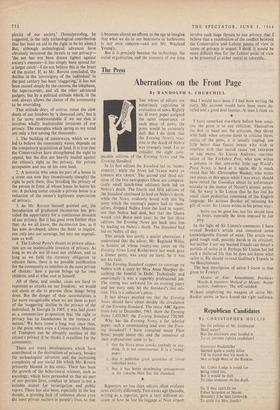The Press
Aberrations on the Front Page
By RANDOLPH S. CHURCHILL
In its first edition the Standard led on 'NEHRU ANXIETY,' while the News led 'FLASH POINT IN LONDON BUS CRISIS.' The second and third edi- tions of the two newspapers (these are compara- tively small lunch-time editions) both led on Nehru's death. The fourth and fifth editions of the Standard continued to Iead on Nehru's death, while the News, evidently bored with this big story which the evening's papers had to them- selves, dropped Nehru from the lead to report, not that Nehru had died, but that the Queen would visit Bonn next year. In the last three editions the Evening News got back into line by leading on Nehru's death. The Standard had led on Nehru all day.
This switch was surely a quaint aberration. I understand that the editor, Mr. Reginald Willis, in honour of whose twenty-one years on the Evening News Lord Rothermere last week gave a dinner party, was away on leave. So it was not his fault.
The Evening Standard_ capped its coverage on Nehru with a story by Miss Anne Sharpley de- scribing the funetal in Delhi. Technically and emotionally it was a superbly professional 'job. The timing was awkward for an evening paper and her story only hit the Standard's last edi- tion. This is a collector's piece.
It has always puzzled me that the Evening News should have about double the circulation of the Evening Standard. The latest ABC figures from July to December, .1963, show the Evening News 1,433,963; the Evening Standard 770,509.
Why has the Evening News, a far inferior paper, such a commanding lead over the Even- ing Standard?. I have consulted many Fleet Street people about this and the consensus of their explanations seem to be: 1. that the News never attacks anybody or any- thing. It is not controversial. It is a 'sunny' paper;
2. that it publishes great quantities of trivial suburban news;
3. that it has better distributing arrangements in the suburbs than has the Standard.
Reporters no less than editors often evaluate news entirely differently. Two weeks ago Quoodle, writing as a reporter, gave a very different ac- count of how he lost his luggage at Nice airport than I would have done if I had been writing the story. My account would have been more de- tailed and a good deal funnier. At least I think so. *
I have remarked elsewhere before how sensi- tive the press is to any criticism. Themselves the first to hand out the criticism, they shiver with funk when anyone dares to criticise them; critics of the press, it is usually implied, are little better than fascist beasts who wish to interfere with that sacred cause THE FREEDOM OF THE PRESS. Sir Linton Andrews, one-time editor of the Yorkshire Post, who now writes a column in that unworthy little rag World's Press News, is hard at it again.• He is much vexed that Mr. Christopher Booker, who wrote two pieces in this space while I was away, should have rotted the Guardian about its unfortunate mistake in the matter of Nasser's atomic poten- tial. So waxy is Sir Linton that he has lost his usual clean pedestrian command of the English language. He accuses Booker of misusing his gift of satire. Sir Linton writes in his prissy way:
Satire can be great fun, but fun should have its limits, especially the limits imposed by fair play.
In the light of Sir Linton's comments I have re-read Booker's article and consulted some knowledgeable friends of mine. The article was good rough stuff, possibly harsh in its criticism, but neither I nor my learned friends can detect a particle of satire in it. Perhaps Sir Linton has led such a sheltered life that he does not know what satire is. He should re-read Gulliver's Travels to the Houyhnhnms.
The best description of satire I know is that given by Fowlei:
Motive or Aim: Amendment; Province: Morals & manners; Method or Means: Accen- tuation; Audience: The self-satisfied.
Without employing the weapon of satire Mr. Booker seems to have found the right audience.






































 Previous page
Previous page